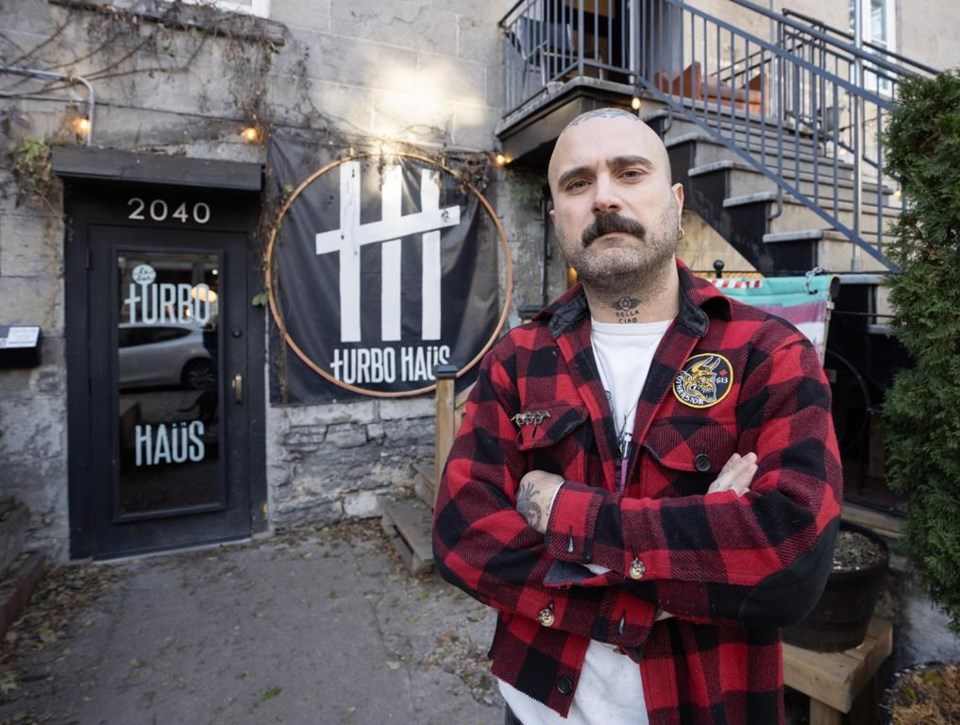Montreal bar and live music venue Turbo Haüs is doing everything it can to mitigate noise and be a good neighbour, says co-owner Sergio Da Silva.
The punk rock institution moved in 2018 from a mostly residential neighbourhood to the lively downtown theatre district known as the Quartier des Spectacles. It spent thousands of dollars soundproofing the new space and pays an extra $3,200 in rent each month to keep the two apartments above it empty.
So a warning from the city last week to reduce noise came as a shock.
"Nice to know it's illegal to have des spectacles in the … Quartier des Spectacles," Turbo Haüs lamented in a widely circulated social media post alongside a screenshot of the city notice, which threatens fines of up to $12,000.
"It's a bit surprising and pretty frustrating to be honest," Da Silva said in a recent interview.
He's one of several club owners calling on Montreal to update noise bylaws and development rules to better protect its small venues — revered nightlife destinations that have in recent years found themselves increasingly surrounded by new residential construction.
The venues serve as a key avenue to success for emerging artists, says Dan Seligman, creative director of music festival POP Montreal. Band Arcade Fire and DJ Kaytranada are among the countless acts that bounced between Montreal clubs and stages on their way to greater fame, he said.
"On a cultural level, I think we'd all be much, much worse off without these places."
Da Silva is confident a complaint from a resident in the new building behind Turbo Haüs spurred the warning from the city.
"The issue here is there aren't rules in place to enforce (for) new people coming into currently existing ecosystems," he said.
Montreal noise rules vary by borough but are generally subjective and give too much credence to complaints, says Jon Weisz, director of Scènes de Musique Alternatives du Québec, an association of about 50 independent music venues.
"They're incredibly one-sided and they leave open the possibility for venues to essentially get closed down by one unhappy neighbour," Weisz said. Montreal police, meanwhile, "just kind of wing it" when responding to noise complaints, he added. "They just kind of walk into the space and decide on site whether it's too loud or not."
Bylaws in the central Ville-Marie borough, where Turbo Haüs is located, empower police officers to determine — without the use of sound equipment — whether noise is disturbing to nearby residents.
Both Weisz and Da Silva want Montreal to apply what's called the "agent of change" principle to development around music venues, which would put the onus on developers to adapt their projects to existing noise conditions.
Toronto has such a rule, requiring new development in mixed-use neighbourhoods to incorporate design or construction elements that dampen sound from music venues. The regulation applies the other way, too, mandating sound mitigation design in new live music spaces. As well, the city has a regulation that requires residential developments near music venues to notify new residents of potential noise.
Montreal has offered soundproofing subsidies to small venues since 2022, but sound insulation alone doesn't eliminate the risk of noise complaints, Da Silva and Weisz say.
"I like С����Ƶ in a mixed-use neighbourhood. I think that's a good idea and it's good use of space," Da Silva said. "There needs to be regulation added so that people can live harmoniously."
He, Weisz and others say persistent noise complaints and fines are exacerbating what is already a difficult financial environment for small music venues, which have been battered by the pandemic and high inflation. They warn that Montreal risks losing a cherished element of its culture unless the city's administration takes action.
"Montreal's noise bylaws absolutely threaten independent venues in the city," Weisz said. "I think it's probably one of the biggest threats I would say to the existence of certain venues … because they're working on razor-thin margins."
This report by The Canadian Press was first published Nov. 26, 2023.
Thomas MacDonald, The Canadian Press



